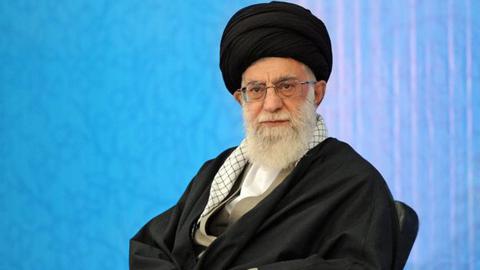President Hassan Rouhani’s persistent battle with Iran’s high-level clerics was re-triggered last week after Rouhani gave a speech about “the people’s choice” — and, shortly after, had to backtrack. The recent controversy emerged in the run up to the official start to Rouhani's second term as president, which takes place on August 6, days after Ayatollah Khamenei confirms and “validates” the appointment on August 3.
“The Commander of the Faithful believes that foundation of Vilayat, the foundation of the government, is the people’s choice,” Rouhani — himself a cleric — told an audience of academics and medical doctors on June 14. But following harsh criticism, on June 20, he tried to correct himself. “Monotheism, divine revelation, Imamah [the acceptance of the 12 Shia imams as the rightful successors to Prophet Mohammad] and divine justice are not subject...to elections,” he told an audience of fellow clerics.
Officially, Rouhani’s quarrel with some of the country’s most influential religious men — the chairman of the Assembly of Experts, Ahmad Jannati, his predecessor Mohammad Yazdi and the hardliner Ayatollah Naser Makarem Shiraz — is over the legitimacy of the Islamic Republic according to Shia jurisprudence and how it relates to the Iranian people casting their votes.
It’s an old bone of contention in Iranian theocracy. Leafing through Islamic Government, the magazine published by the Assembly of Experts, it’s clear that there are a vast number of different views on the subject. It all started on February 1, 1979. Upon his return to Iran from exile, the founder of the Islamic Republic Ayatollah Khomeini addressed the people of Iran. “With the support of the people I will appoint the government...because this nation trusts me,” he announced. With this speech, Khomeini positioned the concept of the “popular vote” squarely in the middle of any discussion about the nature of an Islamic government. It has remained there ever since.
According to the preamble of the Iranian constitution, the Islamic Republic is founded on the principle of Vilayat-e Faqih, or “the Guardianship of the Islamic Jurist”, as formulated by Ayatollah Khomeini. But Article 1 of the constitution brings in the popular will, and states that the “form of government of Iran is that of an Islamic Republic, endorsed by the people of Iran...”. Furthermore, the constitution also provides for a modern form of government with three independent branches — the executive, the legislature, and the judiciary, the first two of which are directly elected by the people.
Elections or Oath of Allegiance?
If in his June 20 speech, Rouhani had only mentioned the “government,” meaning the executive branch, and had steered clear of any mention of “Vilayat,” this controversy could have been avoided. In addition, some people — including Rouhani himself — have equated elections with the concept of “giving allegiance” or making a “pact,” as practiced by Prophet Mohammad and many followers of early Islam. But others, like Jannati, say that elections are the delegation of power, like giving the power of attorney to somebody, and so they have nothing to do with swearing allegiance.
In support of President Rouhani’s comments, several people referred to Ayatollah Khamenei’s statements of three decades ago. “The legitimacy of Vilayat and the government depends on people giving their allegiance,” Khamenei said. However, he used the phrase “depends on” — somewhat different from “founded on”. And depending on how the word “legitimacy” is defined, Khamenei might have meant something like “conceding to” or “realization of”, definitions that would work in the context of his speech. The “Commander of the Faithful [Imam Ali, the first Shia imam],” he emphasized, “believed himself to be anointed by the Prophet and the true owner of the right to rule.” Needless to say, not only Rouhani but even Khamenei himself cannot overrule Imam Ali.
However, in the remaining days before Khamenei “validates” Rouhani’s election to a second term, it is the political aspect of the controversy that is significant. So what are the politics of this battle to define the will of the people in the context of the Islamic Republic’s adherence to Vilayat-e Faqih?
1. The People’s Voice. In his June 14 speech, Rouhani discussed the relationship between Vilayat and the government on one hand and the popular vote on the other, concluding that both Ayatollah Khomeini and Ayatollah Khamenei “have endeavored to listen to the people’s voice.” What he was saying was simple: “Listen to the 24 million voters who voted for me.” But a look at Khamenei’s speeches after the presidential election clearly shows that the Supreme Leader has not heard the people’s voice — or is unwilling to listen to it. It’s as if Rouhani is trying to turn the volume up so the people’s voice can be heard more clearly. Khamenei is more likely to amplify the Vilayat-e Faqih.
2. The Khomeini Card. In both his June speeches, Rouhani cited Ayatollah Khomeini. This is the same approach taken by the late Akbar Hashemi Rafsanjani. He repeatedly reminded Khamenei of Khomeini’s conduct and talked of the necessity of going back to the “Imam’s time.” Of course, Khamenei has his own interpretation of Khomeini’s time, and of his conduct. Occasionally, when the supreme leader feels too much pressure from the reformists, he quips that they would have had many more grievances if he were to behave as Khomeini did.
Hassan Rouhani tried speak about the legitimacy of the president’s power and authority in a language that Iran’s conservative principlists would understand, but it was a step too far. The past three decades have shown that such blunt instruments are useless when it comes to the formidable armor and power of people like Ayatollah Jannati. Rouhani's attempt to fortify his authority has once again met with ample and unwavering resistance.
visit the accountability section
In this section of Iran Wire, you can contact the officials and launch your campaign for various problems


























comments